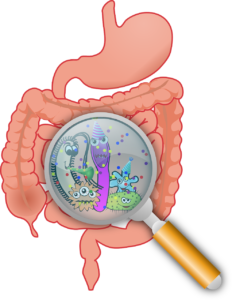What is the Microbiome?
With the ‘Microbiome’ being a hot topic right now for anyone interested in health, it’s worth Understanding the Gut Microbiome, taking a closer look at what it is and what affects it.
Your gut is home to an ecosystem of microorganisms, and this internal community, known as the gut microbiome, plays a crucial role in your well-being.
It is made up of a massive 38 trillion microbes that includes bacteria, viruses, fungi, and more.
In short, your microbiome is a flourishing and diverse ecosystem containing a wide variety of beneficial bacteria and microorganisms.
Why would you need a Healthy Microbiome?
When your microbiome is healthy and balanced, it has hardly any potentially harmful or disease-producing bacteria and has wide-reaching beneficial health effects. Here are some of it’s critical functions.
- Digestion: Gut bacteria help break down and digest food. In doing so, nutrients are more accessible to your body.
- Immune System Support: A healthy gut microbiome can strengthen your immune system, helping you fight off infections and diseases. And you get rid of waste products effectively.
- Mood and Brain Health: Your gut health can affect your mood and mental well-being.
- Metabolism: The microbiome can influence your metabolism and even play a role in weight management.
- Inflammation: A balanced gut microbiome can help reduce inflammation in the body, which is linked to various chronic diseases.
 But, if your gut microbiome (or gut ecosystem) is not as good as it could be and needs a little attention, life in general and even your waistline may be quite uncomfortable.
But, if your gut microbiome (or gut ecosystem) is not as good as it could be and needs a little attention, life in general and even your waistline may be quite uncomfortable.
“You might find that If you feel and look bloated regularly without overindulging, your gut microbiome might be trying to tell you something!”
This brings us to looking more closely at something called Dysbiosis, a term used when our gut Bugs are Out of Balance.
So let’s look more closely at this term, Dysbiosis
Disruption to your internal microbial community can create an environment where pathogenic (disease-causing) organisms are able to grow and flourish.
This means there is a reduction in both the number and/or diversity of the beneficial microorganisms in your gut.
This imbalance in your gut microbiome is termed ‘dysbiosis’ and can lead to a number of negative health effects.
This can be digestive complaints, nutrient deficiencies and a compromised immune system which can lead to allergies and/or frequent illness.
Put plainly, dysbiosis disrupts the healthy functioning of your gut.
When this happens you could experience some uncomfortable symptoms like digestive pain and bloat.
It could also lead to nutritional deficiencies or even a compromised immune system.
Five ways you can upset your microbiome and cause Dysbiosis
- Eating a low fibre diet: as your gut microbes rely on the fibre in your food for fuel, a low fibre diet leads to a reduction in the diversity of your microbiome.
- Alcohol intake: the consumption of alcohol can result in dysbiotic changes in your intestinal microbiome.
It also triggers gastrointestinal inflammation. So, If you’re consuming more than one standard drink per day, your microbiome’s probably keen for you to abstain a bit more often! - Unmanaged stress: when you are stressed, the release of the stress hormone cortisol, and adrenaline sensitise your body to inflammation, including gut inflammation. This disrupts the gut environment, compromising the conditions your beneficial microbes need to flourish.
- Leading a sedentary lifestyle: lack of exercise has also been linked to reduced microbial diversity in the gut – another reason to get moving!
- Antibiotic use: a round of antibiotics does lead to some loss of core commensal organisms (antibiotics are supposed to kill off bacteria however in this instance the good stuff goes too). This leaves the gut susceptible to microbiome imbalances and dysfunction. Due to this disruption, up to 10% of people experience gastrointestinal side effects5 from antibiotic use, referred to as antibiotic-associated diarrhoea (AAD).
 Dysbiosis and bloating have also been linked with digestive disorders such as irritable bowel syndrome (IBS), as well as small intestinal bacterial overgrowth (SIBO).
Dysbiosis and bloating have also been linked with digestive disorders such as irritable bowel syndrome (IBS), as well as small intestinal bacterial overgrowth (SIBO).
SIBO is a type of chronic infection in which bacteria that usually live in the large bowel reproduce in large numbers and travel to the small intestine, somewhere they should not be.
This can cause excessive bloating, flatulence and digestive discomfort.
Gut Bacteria that release methane gas
Some of the bacteria involved in dysbiosis, release methane gas.
If you have dysbiosis, these gut bacteria, also known as ‘methanogens’ may well be lurking in your gut.
When they break down fibre from your food, these bacteria release methane gas.
This can cause bloating, sluggish digestion, slow transit time (the amount of time food takes to travel from your mouth, through your gut, and out the other end), constipation, bloating, flatulence and gut discomfort.
Because excess methane production is connected with chronic constipation, it may be worth finding out if methanogens are making you feel stopped up.
 In short, Bad Bugs cause disruption!
In short, Bad Bugs cause disruption!
By disrupting your internal gut microbiome, dysbiosis can create an environment where disease-causing organisms have the opportunity to flourish.
How do we get these disease-causing organisms?
Well, we simply pick up potentially harmful bacteria and stubborn yeasts in our daily activities!
As mentioned above, This could be from our dietary choices, some antibiotic use, a lack of exercise or unmanaged stress.
If our gut microbiome is really good, it is able to kill off and dispose of these critters very effectively.
On the other hand, if our gut microbiome is struggling, disease-causing bugs can take over.
Perhaps you have had a bout of gastro?
This brings us to when you first noticed your gut issues.
Perhaps it coincided with a nasty bout of gastro or if you’ve been overseas where you had a bad case of Bali’s belly!
Now such an infection even though successfully treated, can leave you with dysbiosis that can persist. What this can do is leave you vulnerable to further infection.
It’s not unusual to find that after traditional treatment, you have lingering symptoms that can include bouts of nausea, gut pain, loose bowels, constipation, brain fog and severe bloating.
Find the reason for your Chronic Bloating! We now understand that there are multiple reasons why you could be chronically bloated.
So let’s look at the best way to find out what’s going on in your gut. This is by taking a microbiome test.
The results of the Metabiome™ test can help you bring balance back to your gut microbiome and reduce those uncomfortable gut symptoms.
You can read more about Microbiome Testing Here.
It’s Best to Test
Many of our patients with gut issues, have an obviously distorted belly and explain how they can’t tie their belt…
If you sometimes feel like they do, it might well be your microbiome showing these symptoms of bloating, discomfort or dysbiosis.
The results of the Metabiome™ test can highlight what needs to be done to bring balance back to your gut microbiome and reduce those uncomfortable gut symptoms.
Make an appointment with us to have this simple test and get some answers.










Trackbacks & Pingbacks
[…] of beneficial bacteria, is less likely to help you resist infection, including colds and flu (click here to read more about what might upset your gut […]
[…] Unfortunately, many things can reduce your levels of good bacteria (for more information, click https://yourwellnesscentre.com.au/what-is-the-microbiome) […]
Leave a Reply
Want to join the discussion?Feel free to contribute!